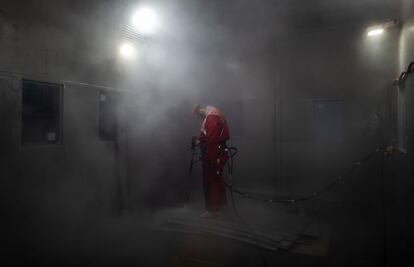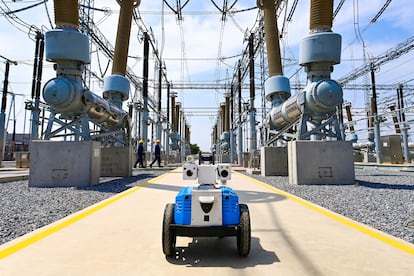Work kills, death to work
The idea of ‘post-work’ advocates not only improving the quality of employment, but also abolishing it. Several essays and books have explored the different possibilities in the face of a reality consisting of precariousness, dangers and mental illnesses, which has already been portrayed in novels

Whether one is hustling, struggling, or working — in short, engaging in that not-infrequently tedious activity, from nine to five, or even longer — a legal notice should be displayed, like on a pack of cigarettes: “work kills.”
Working entails potential physical dangers and rampant precariousness, with obvious repercussions on self-care. Even in its less risky and more generously paid form, it involves a mental burden that affects health just as seriously. Employees declare themselves to be tired, depressed, unmotivated, burned out.
There’s long been speculation that machines will take over the most arduous tasks, as well as those that aren’t so arduous. The most radical thinkers of post-work propose not only the lengthening of vacation periods, the improvement of the quality of jobs, or the payment of a universal basic income, but the outright abolition of work. Yet here we are, stuck on our laptops.
In a 2013 essay titled On the Phenomenon of Bullshit Jobs, American anthropologist David Graeber spilled the beans and publicized an open secret… a reality that many people suffer from, but also a taboo that few have the courage to talk about. In this decadent phase of capitalism, a huge number of jobs — in the private sector, to be more precise — are completely and irremediably useless. They are, simply — as Graeber called them — “bullshit jobs.” Employees are well aware that not only would no one miss these jobs if they didn’t exist, but the world would even be a little better off if nobody was doing them in the first place.
That text ended up becoming a book: Bullshit Jobs. A Theory (2018). Graber — who died in 2020 — offered an operational definition of the term: “A bullshit job is a form of employment that is so completely pointless, unnecessary, or pernicious that even the employee cannot justify its existence. even though the employee feels obliged to pretend that this is not the case.” Thus, a bullshit job would be the one carried out by the protagonist of Unhappiness (2023), the debut novel by Spanish journalist Beatriz Serrano. On a daily basis, Marisa arrives at her post as an advertising executive in a large glass office building downtown. There, she mostly dedicates herself to pretending to be in meetings, watching videos of kittens and planning supposedly feminist campaigns that are as groundbreakingly different as all the previous ones. Wrapped in daydreams, she fantasizes about her own demise, as an escape route until a new day begins.
From the other side of the glass, the life of this worker may look enviable. Inside, however, the proportions of the collapse are catastrophic. “After reading Bullshit Jobs, I got the idea for a story that isn’t exactly about precariousness, but is instead about that false middle-class,” the author notes. She works as a journalist for EL PAÍS.
“I was interested in people who don’t come from prosperous families, but are the kind of people who have a carrot dangling in front of them,” Serrano continues. “Marisa started out as an intern, has already put in a lot of unpaid overtime, has had to juggle several jobs… and has now reached a position where everyone tells her that she should be happy.” But, needless to say, she isn’t even close to being happy.
It’s clear that Marisa isn’t satisfied. Neither is Jaime Rubio, a fictional character named after EL PAÍS journalist and author Jaime Rubio Hancock. In his hilarious novel — The Penske Report (2023) — he squeezes all the comic juice out of a Kafkaesque bureaucracy and the unspeakable torpor of the spiral of meetings with no beginning or end, insipid coffee breaks and pending reports.
This scourge affects corporate jobs, but also, ironically, creative ones… those that, at least on paper, should provide some minimal joy to human beings. In Remedios Zafra’s book The Report (2024) — which also revolves, as its name indicates, around a ridiculous dossier that needs to be filled out— the scientific researcher at the Madrid-based Institute of Philosophy tells the story of a worker who dedicates half of the year to research and the other half to being a shepherd in France.
Zafra’s story begins in one of those absurd and unsettling labyrinths, where requesting something as simple as a work computer becomes an administrative nightmare. This ends up taking up more time and effort than the work itself. Eventually, the reader notes the degradation of — and lack of consideration for — creative jobs. Artificial intelligence is appropriating them, instead of taking responsibility — as one would expect — for the most mechanical and boring tasks.
At a time when technology and teleworking have blurred the boundaries between personal and professional life, extending the working day to a continuum that reaches as far as the elusive horizon of retirement, Zafra warns that “the mere will of a worker” isn’t enough to reverse the situation and put technology to work in favor of humanity. Rather, “it’s necessary to transform the philosophy of work mediated by technology and propose changes at different levels, asking the question: ‘how does what we do affect people’s lives?’”

In her novel, The Employees: A workplace novel of the 22nd century, Danish poet Olga Ravn depicts the extreme alienation of modern times. Embarking on a journey to the planet New Discovery, the passengers of the Six-Thousand Ship offer their anonymous testimonies one by one. Some are people. Others, apparently, are indistinguishable humanoids. They all wonder about their destiny and the meaning behind the only reason for their existence: to labor.
“I’ve never not been employed,” concludes Testimony 031. “I was made for work.”
In this dystopia of people and machines, work is presented as the only sign of life. However, in the perfectly realistic drama of La Centrale (2010), by French author Élisabeth Filhol, a job literally represents a push toward death. In France — with its 56 nuclear reactors — employees like Yann survive by working a variety of temporary jobs. Always on the move, the workers sleep in caravans and hotels, subject to constant tests of the radiation in their bodies. If the safe levels are exceeded, they are left without jobs and without pay. And what’s the next step should this occur? Take a course to retrain as a “safety and radiation protection agent.” The employee of the temporary agency informs the protagonist that this training costs “a month’s gross salary.”
Unlike the bullshit jobs — which are inefficient, but decently paid — Yann’s could be classified as a “dirty job,” according to Graeber’s scale. His occupation has a demonstrable social utility, but the conditions are, at the very least, discouraging. At best, these workers are downright poor. This category would include everything from jobs where workers’ rights are systematically violated and the odd jobs of the very contemporary gig economy – satirized in novels such Temporary (2020), by Hilary Leichter – to the ancient and always feminized work of cleaning, which Eva Baltasar so blatantly inserts into the context of savage capitalism in Sunset and Fascination (2024).
These jobs aren’t exactly pleasant, but at least the “dirty jobs” would be left out… those essential jobs that Eyal Press writes about in his book Dirty Work: Essential Jobs and the Hidden Toll of Inequality in America (2021). He compares these jobs to the work done during the extermination campaign undertaken by the Nazis. Those from the most comfortable strata in Germany were “comfortably removed from the issue and the ‘problem’ [was] being taken care of by someone else.”
In his book, Press travels around the United States, interviewing orderlies in penitentiary centers with psychiatric patients, remote pilots of killer drones, employees of slaughterhouses and oil rig workers. Perhaps he’s only missing some of the mafia types who are portrayed in The Consultant (2023), by Im Seong-sun, where an amateur crime writer is hired by a mysterious corporation to take his stories off paper and turn them into reality.
With roots in the Protestant Reformation of the 16th century and firmly established during the Industrial Revolution of the 19th century, work as we know it must be approached as a decidedly modern invention. It wasn’t always like this… nor does it have to continue being so tomorrow. As Helen Hester and Nick Srnicek explain in their book After Work: A History of the Home and the Fight for Free Time (2023), the paradigm of the nuclear family – although in the process of extinction – continues to govern the popular imagination, underlying the organization of work in contemporary times.
Within this structure, reproductive work — fundamental, yet unpaid — continues to fall mostly on women, despite their massive incorporation into the labor market in the 20th century, brought about by economic crises and attacks on the working class. “In the book, we talk about the idea of communal care,” Hester notes in an email to EL PAÍS. “Today, the family is a privatized care system that’s tremendously overburdened by the demands placed on it. It cannot – and should not – be the sole axis for managing such a large number of care needs in our society. On the contrary, we need to promote the transformation and expansion of care relationships.”

Domestic work — as the philosophers point out — already accounts for up to 30% of the labor market in some countries. And, while it would seem that the technological advances of the last century — such as washing machines and irons — have lightened the workload, the truth is that the time and effort invested (not to mention the environmental impact) continue to be high, due to the rise in quality and hygiene standards.
“One of the main objectives of our book is to bring the emerging movement around post-work into conversation with feminism, because post-work thinking has largely neglected the [nature of tasks] such as cooking, cleaning and care, focusing on jobs that were already automated, in spaces such as factories, warehouses and offices,” Srnicek tells EL PAÍS.
The ultimate goal of their ideas would be the elimination of work. And this is from a pragmatic perspective, rather than a utopic one. “In every society, there will always be some kind of work that needs to be done… work that, if we had a choice, we would choose not to do,” the author notes. “Hence, the goal of post-work politics is to minimize — as much as possible — the efforts required by a society.”
Until then, at the end of the day — inside and outside the home, after the storm of work — calm never comes. As Hester stated in a recent interview with this newspaper, “what we consider to be free time is nothing more than a space for recovery.” Unaccustomed as we are to true idleness, in the transition to the post-work society, it’s urgent to ask questions about what we would do with free time.
In two books — How to Do Nothing: Resisting the Attention Economy (2019) and Saving Time: Discovering a Life Beyond the Clock (2023) — the American artist Jenny Odell reflects on this concept. The first — written before the Covid-19 pandemic — proposes a kind of “action plan for doing nothing.” It starts from a point of criticism that is both subjective and universal, while eventually addressing the so-called “attention economy.” Every last second of our late-capitalist days can be monetized via social media. And, as if this weren’t enough, in recent years – with post-pandemic troubles and the terror of climate change – our very notion of time has been transformed. This is what Odell explores in her second book: in the face of “everyday capitalist incarnation” — our incessant productivity — she advocates for “recovering [humanity’s] fundamentally irreducible and inventive nature.”
The anarchist author Bob Black already wrote this in his 1985 essay, The Abolition of Work. He dealt with William Morris’ utopian thought: yes to activity, but as play. Otherwise, according to him, “no one should ever work.” Let us then move on — as Black urges — to the struggle: “Workers of the world… relax!”
Recommended readings
Bullshit Jobs: A Theory
David Graeber
Simon & Schuster, 2018
368 pages
The Employees: A workplace novel of the 22nd century
Olga Ravn, translated by Martin Aitken
New Directions, 2022
144 pages
Nomadland: Surviving America in the Twenty-First Century
Jessica Bruder
W. W. Norton & Company, 2017
320 pages
Temporary
Hilary Leichter
Coffee House Press, 2020
208 pages
Dirty Work: Essential Jobs and the Hidden Toll of Inequality in America
Eyal Press
Farrar, Straus and Giroux, 2021
320 pages
The Consultant
Im Seong-Sun, translated by An Seon Jae
Raven Books, 2023
199 pages
After Work
Helen Hester and Nick Srnicek
Translation by Maximiliano Gonnet
Verso, 2023
288 pages
How to Do Nothing: Resisting the Attention Economy
Jenny Odell
Penguin Random House, 2023
400 pages
Saving Time: Discovering a Life Beyond the Clock
Jenny Odell
Penguin Random House, 2023
400 pages
The Abolition of Work and Other Essays
Bob Black
Loompanics Unlimited, 1985
165 pages
Sign up for our weekly newsletter to get more English-language news coverage from EL PAÍS USA Edition
Tu suscripción se está usando en otro dispositivo
¿Quieres añadir otro usuario a tu suscripción?
Si continúas leyendo en este dispositivo, no se podrá leer en el otro.
FlechaTu suscripción se está usando en otro dispositivo y solo puedes acceder a EL PAÍS desde un dispositivo a la vez.
Si quieres compartir tu cuenta, cambia tu suscripción a la modalidad Premium, así podrás añadir otro usuario. Cada uno accederá con su propia cuenta de email, lo que os permitirá personalizar vuestra experiencia en EL PAÍS.
¿Tienes una suscripción de empresa? Accede aquí para contratar más cuentas.
En el caso de no saber quién está usando tu cuenta, te recomendamos cambiar tu contraseña aquí.
Si decides continuar compartiendo tu cuenta, este mensaje se mostrará en tu dispositivo y en el de la otra persona que está usando tu cuenta de forma indefinida, afectando a tu experiencia de lectura. Puedes consultar aquí los términos y condiciones de la suscripción digital.









































